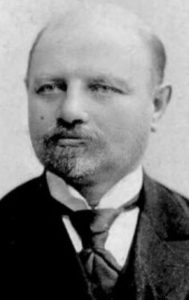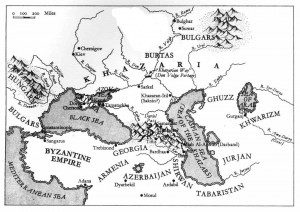Israel’s Great Pioneers
 Israel Belkind (1861-1929) was born near Minsk, Belarus. After a Hebrew elementary school education, he enrolled at a Russian gymnasium and planned to study in university. However, the terrible 1881 pogroms turned him into a passionate Zionist, and the rest of his life was dedicated to saving the plight of diaspora Jews. He founded an organization called BILU (an acronym of Beit Yaakov Lechu v’Nelcha, from an End of Days prophecy in Isaiah 2:5, where the Biblical prophet encourages Jews to get up and take possession of their land). In the summer of 1882, Belkind led the first group of Biluim to the Holy Land. After several years of working on Jewish agricultural settlements, he decided to focus on education instead. He taught at a school in Jaffa, and then in Jerusalem. In 1904, Belkind started his own school for children orphaned by the devastating Kishinev Pogrom. Meanwhile, Belkind wrote several important Zionist texts, and was also a noted anthropologist. Intriguingly, he did a great deal of research among the local Arab population and came to the conclusion that they must be the descendants of Jews who had been forcibly converted to Islam! He noted how the locals did not even refer to themselves as “Arabs”, but only “Muslims” (they called the Bedouins “Arabs”), and many of them knew about their Hebrew ancestors. They had various customs that resembled Jewish ones, used an Arabic dialect peppered with old Jewish terms, and venerated the same Biblical figures as the Jews. His dream was thus to open Hebrew schools for the Palestinians, and slowly return them to the Jewish fold. (Later, thanks to the opportunities created by the Zionist movement, a massive influx of non-indigenous Arab immigrants came from neighbouring areas, particularly Egypt, Syria, and Lebanon.)
Israel Belkind (1861-1929) was born near Minsk, Belarus. After a Hebrew elementary school education, he enrolled at a Russian gymnasium and planned to study in university. However, the terrible 1881 pogroms turned him into a passionate Zionist, and the rest of his life was dedicated to saving the plight of diaspora Jews. He founded an organization called BILU (an acronym of Beit Yaakov Lechu v’Nelcha, from an End of Days prophecy in Isaiah 2:5, where the Biblical prophet encourages Jews to get up and take possession of their land). In the summer of 1882, Belkind led the first group of Biluim to the Holy Land. After several years of working on Jewish agricultural settlements, he decided to focus on education instead. He taught at a school in Jaffa, and then in Jerusalem. In 1904, Belkind started his own school for children orphaned by the devastating Kishinev Pogrom. Meanwhile, Belkind wrote several important Zionist texts, and was also a noted anthropologist. Intriguingly, he did a great deal of research among the local Arab population and came to the conclusion that they must be the descendants of Jews who had been forcibly converted to Islam! He noted how the locals did not even refer to themselves as “Arabs”, but only “Muslims” (they called the Bedouins “Arabs”), and many of them knew about their Hebrew ancestors. They had various customs that resembled Jewish ones, used an Arabic dialect peppered with old Jewish terms, and venerated the same Biblical figures as the Jews. His dream was thus to open Hebrew schools for the Palestinians, and slowly return them to the Jewish fold. (Later, thanks to the opportunities created by the Zionist movement, a massive influx of non-indigenous Arab immigrants came from neighbouring areas, particularly Egypt, Syria, and Lebanon.)
Belkind’s older sister was Olga Hankin (1852-1943). She studied in St. Petersburg to become a midwife. Olga joined her brother in the Holy Land during the First Aliyah of 1886, making her the first professional midwife in the region. She soon became the most famous midwife in the land, and was sought out by Jews, Christians, and Muslims alike. She made a name for herself as being the only woman to ride alone on horseback—even at night—and became something of a feminist icon. Olga married Yehoshua Hankin (1864-1945), originally from Russia. Hankin was well-respected by local Arabs, and was able to negotiate a purchase of a massive plot of land on behalf of the Zionist movement in 1890. This land became what is today the city of Rehovot, a name proposed by Israel Belkind based on a verse in Genesis. In 1891, using donations from diaspora Jews, the Hankins purchased what is today Hadera (the neighbourhood of Givat Olga in Hadera is named after Olga Hankin). In 1908, Yehoshua Hankin joined the Palestine Land Development Company and became its number-one real estate agent in the Holy Land. His most famous deal was the Sursock Purchase, acquiring Haifa Bay and the Jezreel Valley from the Sursocks (an Orthodox Christian family who had purchased the land from the Ottomans decades earlier). Hankin’s work secured hundreds of thousands of dunams of land for the Jewish cause, and he is credited with being the top negotiator of land purchases in Israel’s history.
Understanding the Arab-Israeli Conflict in 5 Easy Points
The Incredible Story of the “Mensch of Malden Mills”
Words of the Week
We are worth what we are willing to share with others.
– Sir Moses Montefiore



